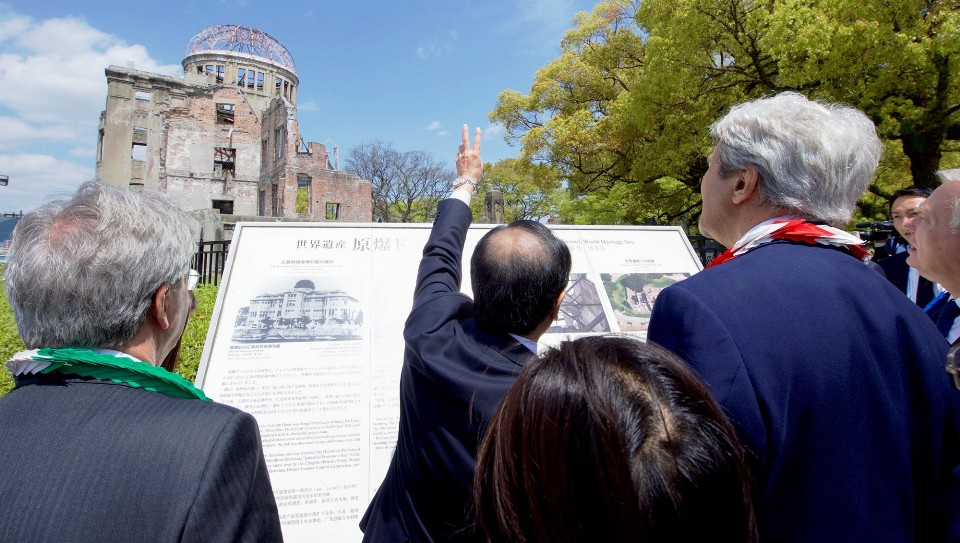In April, I wrote a commentary encouraging President Obama to visit Hiroshima.

Hiroshima Mayor Kazumi Matsui shows U.S. Secretary of State John Kerry and others the Hiroshima Peace Memorial — the remains of the former Prefectural Industrial Promotion Hall in Hiroshima, Japan.
As reported in The New York Times three days ago (May 10), “President Obama will become the first sitting American president to visit Hiroshima, Japan…” since the United States dropped an atomic bomb, ending World War II.
In a blog post, White House Deputy National Security Advisor for Strategic Communications Ben Rhodes wrote, “On May 27, the President will visit the Hiroshima Peace Memorial Park, a site at the center of the city dedicated to the victims of the atomic bombing, where he will share his reflections on the significance of the site and the events that occurred there. He will not revisit the decision to use the atomic bomb at the end of World War II. Instead, he will offer a forward-looking vision focused on our shared future.”
However, this is not part of an “apology tour,” as some Washington pundits have suggested.
As Rhodes makes clear, “…the United States will be eternally proud of our civilian leaders and the men and women of our armed forces who served in World War II for their sacrifice at a time of maximum peril to our country and our world. Their cause was just, and we owe them a tremendous debt of gratitude, which the President will again commemorate shortly after the visit on Memorial Day. This visit will offer an opportunity to honor the memory of all innocents who were lost during the war.
“The President’s time in Hiroshima also will reaffirm America’s longstanding commitment — and the President’s personal commitment — to pursue the peace and security of a world without nuclear weapons.
“That commitment has guided our efforts to promote non-proliferation and nuclear security — a theme at the heart of four Nuclear Security Summits that the President hosted — and to take concrete steps to reduce the role of nuclear weapons in our security and in the policies of other global powers.”
“The mayor of Hiroshima, Kazumi Matsui,” The Times writes, “welcomed the visit but said in a statement he wanted Mr. Obama to outline “concrete steps” to further the cause of disarmament. Last year, on the 70th anniversary of the bombing, Mr. Matsui accused “selfish” nuclear powers, including the United States, of standing in the way of that cause by insisting on maintaining their arsenals.
“Sunao Tsuboi, 91, a leading antinuclear activist in Hiroshima, who was burned by the bomb blast on Aug. 6, 1945, also welcomed Mr. Obama’s visit, which he said he hoped would ‘project a broad antinuclear message.’
“ ‘I was one of the first people who said Obama should visit Hiroshima,’ he told NHK, Japan’s national public broadcaster. ‘Good for him for coming.’ ”
Comments
Leave a Comment











I well-remember the day neighbors gathered around an automobile with a radio announcing the Hiroshima raid. I was 10 and like all kids of that era, had pitched in to gather scrap, sell Victory bonds, knit squares for veterans’ quilts and live with gas, meat, butter, milk, and sugar rationing (with ration books).
By then we all knew how devastating Pearl Harbor had been, how difficult and bloody would be the conventional invasion of the Japanese Home Islands, based upon the kamikaze air attacks and never surrender attitude we found in the Marianas, on Okinawa, and Iwo Jima. Two million casualties were projected for both sides. The simple facts are that B-29 incendiary raids during the final year killed more Japanese than both atomic bombs together and had not forced the Emperor to surrender.
I recommend a new book by James Scott: “Bombing Tokyo,” a fabulous read about the Doolittle Raid in April 1942. In revenge, Japanese troops shot or beheaded three of the handful of raiders they captured (most crews of the 16 planes bailed out over China) and then in Eastern China which they occupied, killed nearly 700,000 men, women, children and all farm animals in acts of revenge that I found difficult to read and was unaware of. They stuffed bodies down village wells to poison them forever and spread anthrax and even tried plague-infected rats to achieve their killing. Events like that characterized the Imperial Japanese Military at the time, and “scholars today” may condemn President Truman’s use of the bombs, but those who lost kids in WW II and especially troops scheduled to leave victorious Europe and invade the home islands will be forever grateful.
And yes, I hope, but cannot bet on the fact we will Never see that mushroom cloud again.